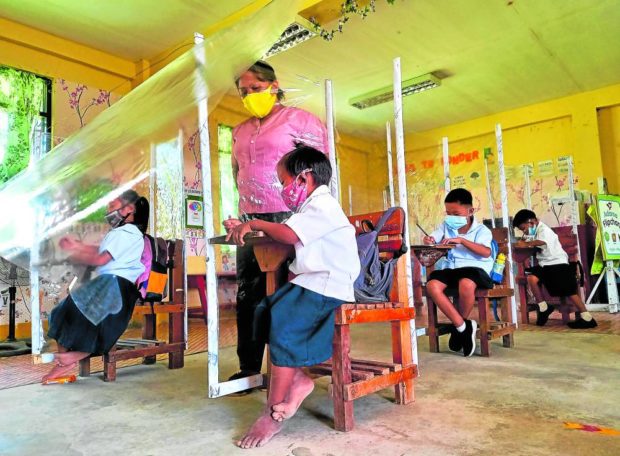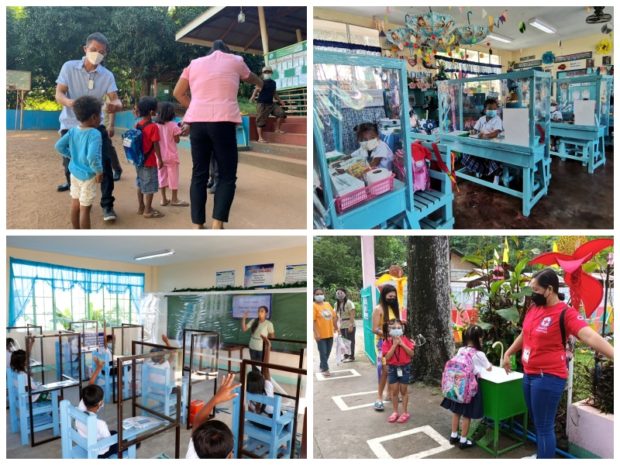Teachers teary-eyed, kids happy as they meet again in classrooms

FIRST DAY HIGH For some pupils in Ligao City, Albay, returning to their classrooms on Monday is more important than having a new footwear. —MICHAEL B. JAUCIAN
It was an emotional reunion for students and teachers in many of the 100 schools that started the pilot run of in-person classes around the country on Monday, with children beaming with excitement to see their classmates again after more than a year of distance learning.
Health protocols were strictly observed as students and teachers followed rules on physical distancing and wearing of face masks. Hand-washing stations were also set up on campuses.
However, some students returning to school were welcomed to their classrooms not just by their teachers, but also by policemen carrying firearms in violation of existing rules.
A photo posted by ABS-CBN News online showed police officers carrying long firearms inside the classroom where the pilot implementation of in-person classes at Longos Elementary School in Alaminos City, Pangasinan province, was taking place.
This was in violation of the Department of Education (DepEd) Order No. 032, Series of 2019, which stated that schools must be free from the presence of armed forces and, if needed, they should be located near the schools and not inside.
Article continues after this advertisementAlaminos City Schools Superintendent Lorna Bugayong said they requested police security during the opening of classes because there were government officials and other visitors coming to inspect the pilot run.
Article continues after this advertisement“But we asked them to stay outside the campus and even provided a table for them. We were surprised when the police entered the classroom so we asked them to leave,” Bugayong told the Inquirer by phone.
A Makabayan lawmaker has protested the presence of the armed policemen on the first day of limited in-person classes.
House assistant minority leader and ACT Teachers Rep. France Castro said teachers and nonteaching personnel were already there to ensure that students observed the minimum health precautions and that armed law enforcers had no place in schools.
“To prevent similar incidents in the future, we are reminding our field officials and school heads to strictly enforce our National Policy Framework on Learners and Schools as Zones of Peace,” the DepEd said in a statement on Monday.
Challenges
A different problem was faced by students in Mindanao.
Teachers said most of the students complained of difficulty breathing through their face masks while seated inside the hot plastic cubicles throughout their classes, which often lasted three straight hours.
Anna Marie Dingding, a Grade 1 teacher in Linamon, Lanao del Norte province, said the challenge in the new classroom setup also included her limited interactions with her learners.
“I could no longer embrace them like I used to do because I used to make them feel that I was not only their teacher but also more like their mother,” Dingding said.

WELCOME BACK Officials in schools participating in the pilot run of in-person classes, like those in (clockwise from upper left) Zambales, Lanao del Norte, Aklan and Pangasinan, ensure that health protocols are observed by teachers and students. —PHOTOS BY JOANNA ROSEAGLIBOT, DIVINA SUSON, DEPED WESTERN VISAYAS AND ALAMINOS CITY LGU
She said the most difficult part would be when her students called for help and she would be hesitant to approach them because of fear of possible COVID-19 transmission.
Other teachers were similarly concerned about the “no touch policy” imposed by the DepEd since this limited their ability to assist their pupils.
Athena Buenafe, who teaches kindergarten at Tiongson Elementary School (TES) in Ligao City, Albay province, said some of her pupils did not know how to hold their pencils, but she could not teach them how because they were not allowed to be in physical contact with their students.
She said she just oriented the parents to teach their children at home.
New routine
In Botolan, Zambales province, kindergarten pupil Clariza Cariño scanned her surroundings the moment she stepped inside the school premises after nearly an hour of walk to reach Owaog-Nebloc Elementary School at the village center of an Aeta community.
Her gaze then shifted to temperature and washing stations in one corner where her classmates were lining up, waiting for their turn.
The children were excitedly met by their teacher and were given free masks before they were led one by one to the classroom.
Cariño, 6, then took her seat in front of the class attended by her five other classmates, some barefoot, who were visibly elated to see each other.
“We had a long walk but we’re happy to be here,” a beaming Cariño told the Inquirer in Filipino.
The school at the village center of Owaog is not easily accessible that some of the pupils had to ride carts drawn by carabaos, cross raging rivers and trek through arduous trails to attend classes.
Jerome Nolia, 5, was also excited about attending his kindergarten class at TES in Albay.
“I really wanted to learn and meet my classmates [for the first time],” Nolia said in the vernacular.
Sijan Regay, a Grade 3 pupil in the same school, was elated that he was back in school.
“I can now learn to read and write,” Regay said.
In Ilocos Norte, villages hosting schools holding in-person classes were placed under a “bubble” setup to restrict movement only from students’ homes to the school in order to reduce the risk of transmission, according to DepEd provincial information officer Valerie Talamayan.
In Nabas town, Aklan province, school principal Rosalie dela Torre broke into tears on Monday when two male kindergarten pupils entered Laserna Integrated School.
“They were very cheerful, well-dressed and followed health protocols like hand-washing. I had mixed emotions and goosebumps. Finally, after nearly two years and a lot of preparations and apprehensions, we can welcome them back,” Dela Torre told the Inquirer in a telephone interview.
In Leyte province, Wotwot, one of the two students enrolled in the in-person classes at Palo I Central School in Palo town, hugged his teacher upon entering the classroom that was filled with colorful designs and decorations.